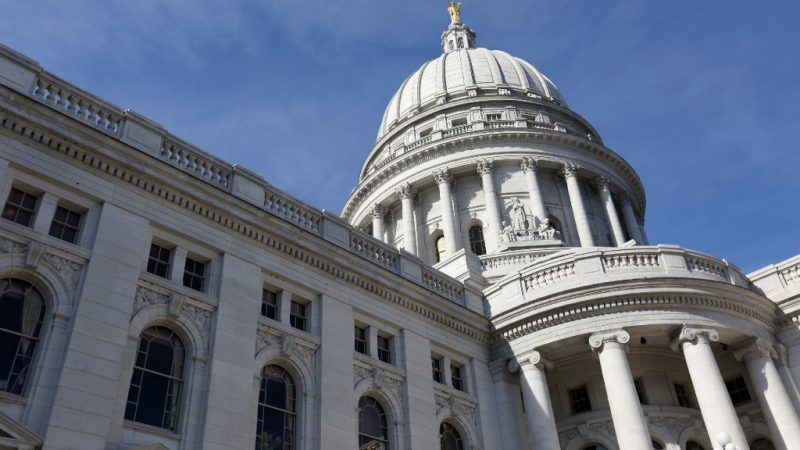Though some have called for beginning to reopen the state’s economy, Gov. Tony Evers says Wisconsin needs a dramatic uptick in testing capacity, among other things, before that step is taken.
Instead, Evers’ administration yesterday extended a stay-at-home order for another month, meaning a cancellation of the remainder of the school year for K-12 students and continuing shutdown of many businesses.
GOP lawmakers quickly cried foul with Senate Majority Leader Scott Fitzgerald, R-Juneau, criticizing the move as a one-size-fits-all approach that doesn’t recognize some areas of the state have been impacted less than others. He said the Senate will look at “legal or legislative relief” to ensure lawmakers are working with the guv on these decisions after not being consulted on the latest move.
But Evers’ legal counsel said Health Services Secretary Andrea Palm was well within her powers, which are separate from the guv’s, in issuing the order extending the stay-at-home directive to May 26.
>> WisPolitics is now on the State Affairs network. Get custom keyword notifications, bill tracking and all WisPolitics content. Get the app or access via desktop.
And Evers said the state also needs more PPE and the ability to do contact tracing of those who test positive for COVID-19 to see who they may have exposed before significantly relaxing the restrictions. He also argued the state needs a comprehensive approach, because lessening the restrictions in a rural area, for example, with few cases risks leading to an outbreak that would overwhelm small hospitals.
“We can’t just parcel out parts of this state and leave them high and dry,” Evers said.
Evers originally declared a public health emergency March 12 that allowed him to make moves such taking steps to protect the public. That power would end May 12 without an extension from the GOP-controlled Legislature, which has shown no interest in doing so.
Still, Palm, who has yet to be confirmed by the state Senate, issued the order citing statutes that give her powers separate from the guv’s.
While extending the stay-at-home order, the new directive also eases some restrictions. That includes allowing libraries to provide curbside pickup and golf courses to reopen starting April 24 with restrictions to limit interpersonal contact such as requiring tee times and payment to be made over the phone or online.
Fitzgerald also knocked the move because Evers didn’t lay out any steps that would be taken to reopen the economy.
Evers has agreed to work with other guvs in the region on reopening their economies and warned the process will take time.
“Everyone agrees that reasonable measures must be taken during a public health crisis,” Fitzgerald said. “Health and safety are a priority, however to extend this order for another month without a plan for how to reopen the state or clear benchmarks for an early expiration is simply unacceptable.”
Some of Fitzgerald’s fellow Republicans, including Sens. David Craig, R-Big Bend, and Steve Nass, R-Whitewater, called on GOP leaders to convene the Senate immediately to reject Palm’s nomination. Nass also encouraged citizens to file lawsuits challenging various parts of the order, while Sen. Duey Stroebel, R-Cedarburg, called on the Legislature to “take the gloves off and resist this power grab” by Evers and Palm.
Assembly Speaker Robin Vos, R-Rochester, and Majority Leader Jim Steineke, R-Kaukauna, demanded to hear from economic and medical experts who support the continuation of the guv’s order. They also complained yesterday’s briefing “gave no actual metrics, no measurable goals, and most importantly, no clear plan to reopen going forward.”
“Legislative Republicans are planning to act with legal and legislative options to deal with the extension of the order and get answers to the questions our constituents are demanding,” they said.
And the state’s largest business group argued a well-thought-out plan could have slowly phased in reopening businesses in certain areas while working with industries to ensure they could protect their employees.
“Not only are there legal questions about the Administration’s authority to extend the Safer at Home order to May 26, there are fundamental questions about why this decision was made,” said Wisconsin Manufacturers & Commerce CEO and President Kurt Bauer, who predicted it would lead to more business shutdowns and more jobs lost.
Evers suggested May 26 is not a hard date to reopen the state.
He noted the process will be more like turning a dial rather than flipping a switch. What’s more, he promised to continue relying on science and discussions with experts as he weighs additional moves.
“If we continue doing what we’re doing, we may be in a position to do this earlier. It may be later,” Evers said. “We will work hard to make sure we do it right.”
Still, the guv also noted it would be a “reasonable assumption” that there will continue to be concerns into the summer about large groups gathering due to the potential it could lead to a spike in cases that would put the state back into the current situation.
He also said his work with the guvs of Michigan, Ohio, Minnesota, Illinois, Indiana and Kentucky will help them learn from each other as they reopen their economies. But he insisted it doesn’t mean, for example, reopening northern Wisconsin will be tied to when it’s safe for Detroit, one of the nation’s hotspots.
“We will be able to learn a lot from each other,” Evers said.
See the order here.
See the release regarding reopening here.



